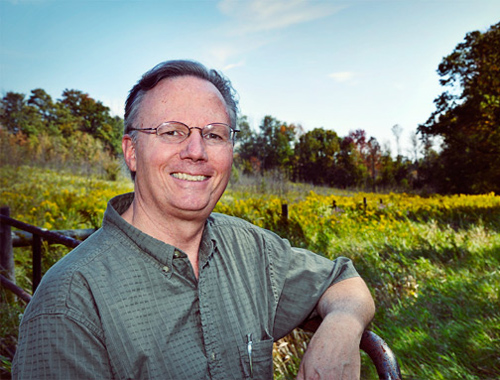
As a U of G student in U of G’s land resources management program, Randy Whitteker says he was “definitely the suburban kid in among the farmers.”
He grew up in Mississauga, but while he was studying at Guelph his family moved east to Prince Edward County and became hobby farmers with a large market garden.
“The courses I studied were very much intended to raise our awareness of dwindling natural resources and the need to protect the environment,” Whitteker recalls. After graduation, he worked for a couple of companies, including Heritage Seeds, but in 1988 he was hired by the Ontario Natural Food Co-op (ONFC) as sales manager.
“With my education, my understanding of agri-business and my family’s involvement in sustainable farming, it was a natural fit for me,” he says. He had already become vegetarian and was raising a family with his wife, another U of G grad, in Guelph.
In 1991, Whitteker was promoted to general manager and continues in that role today. “We now have more than 90 employees and a large warehouse in Mississauga.”
Whitteker will be speaking at the Impact! Youth Conference for Sustainability Leadership to be held at the University of Guelph Sept. 15 to 18h. His son, a student at OCAD University, is one of the 165 students from universities across Canada selected to participate.
“I plan to talk to conference participants about the perils of global food systems and emerging trends such as farmer’s market, the local food movement, the slow food concept and changes in people’s relationships with food,” he says. “There are many different ways to approach the production, distribution and marketing of food. I also want to talk about the links between energy and food, and the kinds of solutions people in this field are working towards.”
ONFC is a member-owned co-op, run by a board of directors. Whitteker says his job is to ensure that the organization is reaching the goals set by the board, and that means being innovative and aware of changes in the industry.
In its early days, nearly half of ONFC’s business came from buying clubs. These were groups of people who got together to order natural and organic foods in bulk from ONFC. The foods would be delivered to one location, and the buying club members would sort them and distribute them to their members.
“At that time, many organic foods and natural food products just weren’t available in ordinary grocery stores,” says Whitteker. “But quite of few of the people who started up the buying clubs went on to open their own natural food stores.”
Buying clubs still continue today, but they represent just five per cent of ONFC’s business. “We provide food for many independent health food stores,” Whitteker explains. “The Stone Store in Guelph is one of our largest accounts, for example. And when Whole Foods came to Ontario, they chose us to be their primary food supplier.”
Whitteker was recently awarded government funding to develop a brand focused on the sustainable development of Ontario-grown and Ontario-processed foods. “We now have a brand manager and sell tomatoes, tofu, kimchee and sauerkraut and other food items under the Ontario Natural brand,” he says. “We put a lot of thought and effort into making this more sustainable.”
Organic foods are still a small segment of the market, but a segment Whitteker says is rapidly growing. “The dominant food system – more than 70 per cent of food is bought in supermarkets – is not serving us well. We need more diversity. We’re depending on a few types of most foods and, increasingly, on genetically-modified crops.”
He describes the current system as “the race to the bottom. By always going for the lowest possible price, we are getting the cheapest labour and the poorest quality, and all of it depends on cheap oil to ship things from around the world.” This, he contends, is not just bad for the environment but for all of us.
For Whitteker, working at ONFC is both professionally and personally satisfying. “It’s gratifying to know that in my professional career I’ve been able to stay focused on my values. And those values developed in part through what I learned at U of G. I’m very grateful for the fine grounding I got in understanding agriculture, the environment and these important issues during my years as a student.”